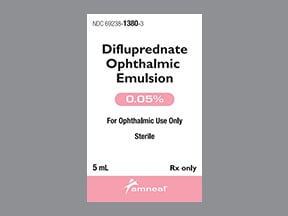
Difluprednate Coupons & Savings Card – Discount Prices from $46.21
Generic for: Durezol
My prescription
Edit
5ML of 0.05%, Difluprednate (1 Bottle)
Select pharmacy

CVS
$46.21
COUPON PRICE
Walmart
$49.04
COUPON PRICE
Walgreens
$59.60
COUPON PRICE
Albertsons
$67.30
COUPON PRICEDifluprednate savings card
Show this card to your pharmacist
CVS
$46.21
BIN
ID
PCN
GRP
019876
LH1110F9DD
CHIPPO
LHX
Powered by
More prescriptions for eye pain
More prescriptions for eye pain
Price history for Durezol (brand) & Difluprednate (generic)
1 Bottle, 5ML of 0.05%
Average retail price for Durezol
Average retail price for Difluprednate
Average SaveHealth price for Difluprednate
Our price history data is based on aggregated prescription data collected from participating pharmacies in America. Our prescription data updates daily to reflect the latest price changes. If you notice a missing data point, it means there wasn't sufficient data available to generate a monetary value for that date.
We analyzed Difluprednate prices for (5ML of 0.05%, 1 Bottle) over the last 12 months. The average retail price was $868.09, while the average price using the SaveHealth discount card was $69.11. That's a savings of approximately 92.04% when using our Difluprednate coupon.
Compared to the generic version, Durezol had an average price of $272.50 over the same time period. With the SaveHealth savings card, Difluprednate is 74.64% cheaper on average than Durezol.
*Retail prices are based on pharmacy claims data, and may not be accurate when we don't have enough claims.
Difluprednate dosage forms
Dosage Quantity Price from Per unit 5ML of 0.05% 1 Bottle $46.21 $46.21 5ML of 0.05% 2 Bottles $74.12 $37.06 5ML of 0.05% 3 Bottles $110.03 $36.68
| Dosage | Quantity | Price from | Per unit |
|---|---|---|---|
| 5ML of 0.05% | 1 Bottle | $46.21 | $46.21 |
| 5ML of 0.05% | 2 Bottles | $74.12 | $37.06 |
| 5ML of 0.05% | 3 Bottles | $110.03 | $36.68 |
